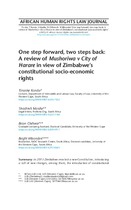One step forward, two steps back: A review of Mushoriwa v City of Harare in view of Zimbabwe’s constitutional socio-economic rights
Abstract
In 2013 Zimbabwe enacted a new Constitution, introducing a raft of new changes, among them, the introduction of constitutional socio-economic rights. Not soon thereafter socio-economic rights were tested in the case of Mushoriwa v City of Harare in 2014. The High Court
made a finding in favour of the applicant, a decision which enforced the right to water in section 77 of the Constitution. The ruling offered the view that the water bylaws used were unconstitutional and contrary to the enabling statute. This judgment was welcomed as a ‘first true test’ of socio-economic rights under the 2013 Constitution. In Hove v City of Harare the High Court judge agreed with the reasoning of the Court in Mushoriwa v City of Harare that, in the event of a genuine dispute of a water bill, there should be a recourse to the courts for remedies. In 2018, however, the Supreme Court overturned the decision in the Mushoriwa case. It declared that water disconnections in terms of the water bylaw are above board. This raises questions as to the constitutional obligation to protect the right to water imposed upon all organs of the state. It is against this background that this article reviews the case of Mushoriwa and makes comments on the effects of this judgment, specifically about the enforcement of socio-economic rights in Zimbabwe.

